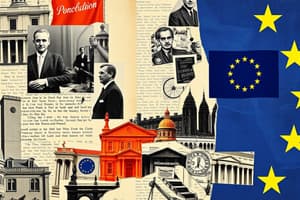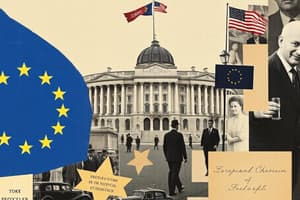Podcast
Questions and Answers
Ireland is one of the 19 Member States in the European EMU that uses the Euro as its official currency.
Ireland is one of the 19 Member States in the European EMU that uses the Euro as its official currency.
True (A)
The European Central Bank's primary goal is to maintain inflation at 5 percent.
The European Central Bank's primary goal is to maintain inflation at 5 percent.
False (B)
The Common Agricultural Policy (CAP) ensures a fair standard of living for farmers in Ireland.
The Common Agricultural Policy (CAP) ensures a fair standard of living for farmers in Ireland.
True (A)
The Common Fisheries Policy (CFP) limits access to fishing grounds to protect fish stocks.
The Common Fisheries Policy (CFP) limits access to fishing grounds to protect fish stocks.
The EU Social Charter guarantees the right to work overtime beyond 48 hours a week without restrictions.
The EU Social Charter guarantees the right to work overtime beyond 48 hours a week without restrictions.
Ireland's economy attracts foreign direct investment due to its access to a small domestic market.
Ireland's economy attracts foreign direct investment due to its access to a small domestic market.
Brexit has created certainty about Ireland's economic future regarding agri-food exports.
Brexit has created certainty about Ireland's economic future regarding agri-food exports.
Competition Policy in the EU prevents large firms from monopolizing the market at the expense of small firms.
Competition Policy in the EU prevents large firms from monopolizing the market at the expense of small firms.
The allocation of CAP funding proposed for Ireland for the 2021-2027 period amounts to €8.148 billion in total.
The allocation of CAP funding proposed for Ireland for the 2021-2027 period amounts to €8.148 billion in total.
Tax harmonization within the EU could strengthen Ireland's competitive position in attracting multinational corporations.
Tax harmonization within the EU could strengthen Ireland's competitive position in attracting multinational corporations.
Flashcards are hidden until you start studying
Study Notes
European Commission
- Executive body of the EU, comprising one commissioner from each member country.
- Focused on defending EU interests over national interests, overseeing day-to-day EU management.
- Ursula Von Der Leyen serves as the president; Mairead McGuinness is the Irish commissioner.
European Commission Functions
- Consults with interest groups and experts on new laws before proposing them.
- Proposes legislation for discussion, requiring approval from the European Parliament and Council of the EU.
- Implements EU laws via regulations, directives, and decisions, ensuring member state compliance.
- Manages EU budget and funding programs, deciding on expenditure in member states.
European Parliament
- Consists of Members of the European Parliament (MEPs) directly elected by EU citizens.
- Currently has 13 MEPs for Ireland, set to increase to 14 in September 2023.
European Parliament Functions
- Discusses and amends proposed legislation from the European Commission.
- Reviews and debates EU budget proposals before returning amendments to the European Commission.
- Supervises EU actions, including project funding, and can appoint or dismiss European Commission members.
Council of the European Union
- Principal decision-making body of the EU, comprising national government ministers based on ministry topics.
- Ministers discuss, amend, and adopt laws, committing their governments to agreed actions.
- Final authority on legislation proposed by the European Commission, in coalition with the European Parliament.
Council of the European Union Functions
- Negotiates and adopts legislation proposed by the European Commission.
- Co-adopts the EU budget alongside the European Parliament.
- Concludes agreements between the EU and external entities.
European Council
- Composed of heads of Member States, the President of the Council, and the Commission.
- Defines political direction and priorities for the EU and addresses complex issues without legislative authority.
European Court of Auditors
- Aims to enhance financial management, accountability, and transparency in the EU.
- Acts as an external auditor of EU accounts, monitoring sound financial practices.
- Provides annual financial reports to the European Parliament.
Court of Justice of the European Union (CJEU)
- Ensures uniform interpretation and application of EU law across all member states.
- Settles legal disputes between national governments and EU institutions and can impose fines for legal breaches.
EU Decision-Making Process
- Drafted by the European Commission, legislation is discussed and amended by the European Parliament before final decisions by the Council of the EU.
- Passed legislation is implemented by the European Commission.
EU Law Implementation Tools
- Regulation: Immediate enforceability across all member states, taking precedence over national law.
- Recommendation: Non-binding opinions advising member states.
- Decision: Legally binding on specific entities or countries.
- Directive: Requires member states to achieve certain outcomes by specific deadlines, allowing flexibility in implementation.
Role of Special Interest Groups in the EU
- Influence political decisions without being part of official structures through lobbying, information campaigns, and public protests.
- Example: Irish Farmers' Association protested in 2019 over falling beef prices.
EU Common Policies
- Include Economic and Monetary Union (EMU), Common Agricultural Policy (CAP), Common Fisheries Policy (CFP), Competition Policy, and the EU Social Charter.
Economic and Monetary Union (EMU)
- 19 of the 27 Member States have adopted the Euro, with outside countries also using it.
- Benefits for Ireland include reduced transaction costs, stability in exports, price comparisons, and foreign direct investment (FDI).
Common Agricultural Policy (CAP)
- Supports farmers' productivity and income, ensuring stable food supplies.
- Provides direct payments and substantial EU funding for rural development.
Common Fisheries Policy (CFP)
- Manages fishing fleets and stocks throughout Europe to ensure equal access and conservation.
- Supports local fishermen while ensuring steady market supplies at reasonable prices.
Competition Policy
- Ensures fair competition, benefiting consumers and preventing exploitation by sellers.
- Example: EU blocked Ryanair's attempted acquisition of Aer Lingus to maintain market competition.
EU Social Charter
- Guarantees human rights related to employment, health, education, and social protection.
- Promotes labor mobility and protects vulnerable groups while imposing certain employer responsibilities.
Reasons to Stay in the EU
- Access to a single European market eliminating trade barriers.
- Benefits from CAP and substantial EU infrastructure funding.
- Attracts FDI with a stable currency and operational environment.
- Allows participation in public procurement across Member States.
Reasons to Leave the EU
- EU regulations may impose additional costs on businesses.
- Questions of national control due to binding EU regulations.
- Uncertainty following Brexit, especially concerning agri-food exports to the UK.
- Safe harbor for corporate tax rates which could be threatened by tax harmonization.
- Potential challenges posed by EU competition for job opportunities.
Studying That Suits You
Use AI to generate personalized quizzes and flashcards to suit your learning preferences.




